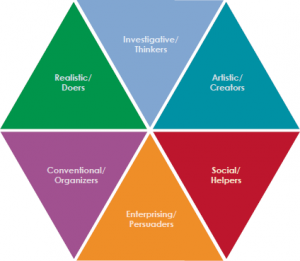No products in the cart.
Posts
Don’t Take The Test, Learn The Holland Code Model
Have you ever heard about the “Holland” codes? No, these weren’t decryption codes used during World War II. The Holland Codes, officially known as the Holland Occupational Themes, are the legacy of renowned psychologist John L. Holland, who incrementally developed this useful tool beginning in the 1960s and refined it up until the time of his death in 2008.
Here’s the model itself. Holland proposes there are six essential career temperaments. To differing degrees, we embody natural strengths and weaknesses related to these temperaments.
They are:
R: Realistic (Doers)
I: Investigative (Thinkers)
A: Artistic (Creators)
S: Social (Helpers)
E: Enterprising (Persuaders)
C: Conventional (Organizers)

Most people, and most jobs, are best represented by some combination of two or three of the Holland interest areas. In addition, most people are most satisfied if there is some degree of fit between their personality and their work environment.
R – Realistic (Doers)
People who have athletic ability, prefer to work with objects, machines, tools, plants or animals, or to be outdoors.
I – Investigative (Thinkers)
People who like to observe, learn, investigate, analyze, evaluate, or solve problems.
A- Artistic (Creators)
People who have artistic, innovating, or intuitional abilities and like to work in unstructured situations using their imagination and creativity.
S- Social (Helpers)
People who like to work with people to enlighten, inform, help, train, or cure them, or are skilled with words.
E- Enterprising (Persuaders)
People who like to work with people, influencing, persuading, leading or managing for organizational goals or economic gain.
C- Conventional (organizers)
People who like to work with data, have clerical or numerical ability, carry out tasks in detail, or follow through on others’ instructions.
Learn and Apply the Model – Don’t Kill Learning with an Assessment
I recently used a very simple handout with a group of educators in a career pathways workshop. We explored the definitions of six career temperaments, did a simple self-rating, and then discussed the value of teaching this model to our children.
Here’s my personal bias. I think that taking a career interest assessment prematurely can actually short-circuit the career exploration process. I had a colleague who turned out to be an workforce economist, but as a teen when he took a career assessment, it told him he should be a “forester or forest ranger.” All he remembered from the test was this strange, out-of-sync career recommendation; he didn’t really internalize any of the self-knowledge that would have really guided his career exploration. In fact, this mis-diagnosis created a skepticism about the value of career development.
Instead, I would strongly encourage you to work with students to understand the model and help them explore careers that capitalize on different aspects of the Holland code model. At some point, taking an actual inventory may make sense. Encourage your students to use it as one piece of data in their career development journey, not as a definitive guidebook.
If you want to access a couple of handouts that describe the Holland Code system, the careers that match under each code, and a self-ranking form, click the following:
Holland Code Personality and Job Match System
Holland Code Self-Ranking Tool
Hans Meeder is President of NC3T, the National Center for College and Career Transitions(www.nc3t.com). NC3T provides planning, coaching, technical assistance and tools to help community-based leadership teams plan and implement their college-career pathway systems and strengthen employer connections with education

